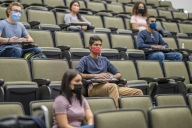You have /5 articles left.
Sign up for a free account or log in.
The University of Illinois at Urbana-Champaign has backed away from dismissing an international graduate student for failing to comply with the university’s mandatory COVID-19 testing policy after more than 18,000 people signed a petition on the student’s behalf.
The high-profile case shines a spotlight on how colleges are using their disciplinary codes to punish noncompliance with COVID-related safety and testing protocols. UIUC says to date it has dismissed 51 students for periods typically ranging from one to four semesters for COVID-related violations, with grounds for dismissal including "leaving isolation or quarantine without permission," "hosting large, unsafe gatherings," "tampering with COVID systems in order to bypass requirements" and "egregious testing noncompliance." Repeat violations of less serious offenses also can be grounds for dismissal.
The graduate student, Ivor Chen, was initially dismissed from the university for one year for failing to comply with the university’s COVID testing requirement, according to representatives of UIUC’s Graduate Employees Organization (GEO) who advocated on Chen’s behalf. The policy requiring twice-weekly COVID testing for undergraduate and graduate students -- one of the more stringent student testing protocols around -- applies to students who live on campus and in the surrounding communities of Champaign, Savoy and Urbana, even if they are taking an entirely remote class schedule.
Chen, a fourth-year Ph.D. candidate studying physics, lives in an off-campus apartment in Urbana with his mother. His representatives on the GEO say he misunderstood the testing requirement and assumed he would not need to come to campus for testing since he was working 100 percent remotely, limiting his excursions outside his home and not regularly coming to campus. As a result, he did not participate in the university's biweekly testing program and was tested a total of just three times over the course of the fall semester.
According to an appeal document prepared by the GEO, a labor union representing teaching assistants and graduate assistants, Chen arrived at an exam center for a scheduled exam on Dec. 11, not realizing the center was university property and that he would need a recent negative COVID test to enter. After being told he could not stay, he left the building immediately.
Kai Shinbrough, a fourth-year Ph.D. candidate studying physics and a representative with the GEO, said Chen's failure to participate in the COVID testing program last fall was "a simple misunderstanding, an honest mistake." The petition supporting Chen argues that his "participation in the university testing system would only increase the risk to himself, his mother, and the campus community."
“Ivor was sheltering in place with his mother. He wasn’t putting himself or anyone else at risk for higher COVID exposure,” Shinbrough said. “Then in late December, December 21, he received his first notice for testing noncompliance, which was also his first notice of a disciplinary charge. The university claims that he should have also received an email in late September notifying him of testing noncompliance, but Ivor doesn’t remember receiving this email and the university to date hasn’t provided any evidence that it was sent to him specifically.”
Shinbrough said a GEO representative attended Chen's disciplinary hearing with the Office for Student Conflict Resolution (OSCR) January 29.
"It's the recollection of the GEO representative that the OSCR committee was condescending and rude to Ivor during the hearing, and following less than 10 minutes of closed session deliberation, that committee decided on the sanctions originally written in the petition, which were dismissal, 80 hours of community service, two written essays, a trespassing notice, and the requirement to petition to re-enter the university after his year of dismissal, which to everyone seemed like a totally unreasonable and disproportionate response," Shinbrough said. Chen appealed, and the university upheld the dismissal Feb. 11.
Chen’s advocates have noted that a one-year dismissal would have disproprotionate potential consequences because of Chen's status as an international student whose ability to lawfully remain in the U.S. is tied to his enrollment at UIUC.
After thousands of people signed a petition on his behalf, the university moved last week to lessen the sanctions, effectively suspending the dismissal, or holding it in "abeyance," which means that while the university found Chen had committed a dismissible offense, he can remain enrolled provided he meets certain requirements and avoids further violations of the student code. Chen said the university is also requiring him to write two 1,000-word essays and complete 25 hours of community service.
“I intend to accept the punishment. This is not the best result one can hope for, but it is something I can swallow,” Chen said in a written statement in which he called for “a more transparent and humane COVID-19 policy.”
“A university is a special place,” Chen said via email to Inside Higher Ed. “Dismissing a student is not at all the same as firing an employee. Of course the university should have power implementing its own rules and regulations. But this power should have boundaries. Their power over students' destinies is immense. At the very least, the university administrators can apply that power with caution.”
A spokeswoman for UIUC, Robin Kaler, said that while federal student privacy laws prevent her from speaking about a specific situation, “I can tell you that our COVID-19 safety protocols (which include the requirement to test regularly) and possible consequences for violating them have been broadly, regularly and frequently communicated throughout the pandemic on virtually every platform available to us.”
"The student disciplinary procedure affords students due process, including the right to written notice of charges, the opportunity for a hearing with an adviser present, the right to present evidence and testimony and the right to appeal a disciplinary action," Kaler said. "The procedure is a system of shared governance led by the Senate in partnership with the Office for Student Conflict Resolution. Cases and appeals in which a student faces separation from the university are heard and decided by a panel of students, faculty and staff. Students are well informed of their rights, responsibilities and options throughout the process. Where new evidence that could have affected the outcome of the appeal becomes available to OSCR within a reasonable period of time after the appeal decision, the Senate Committee on Student Discipline has discretion to reconsider its decision, including any findings and sanctions."
"The safety, health and well-being of our students, faculty, staff and greater community, especially during this pandemic, is our No. 1 priority," Kaler said.
All told, UIUC has brought thousands of disciplinary charges against students for alleged violations of COVID policies. The university reports that 1,344 cases of alleged infractions of COVID policies involving students and/or student organizations have resulted in university-level sanctions, 197 have resulted in university housing-related sanctions and 705 have resulted in no finding of responsibility. Another 1,839 cases were either addressed informally with a warning letter or are still pending.
"Social distancing or face covering violations typically result in a warning on a first offense, a censure on a second, and probation on a third," Chantelle Thompson, the university's chief communications officer for student affairs, said via email. "Unless particularly egregious, a first testing noncompliance case (which is typically only opened after multiple missed tests in a row) typically results in probation. Hosting a smaller gathering that violates state, local, or university expectations might also result in probation."
W. Scott Lewis, a managing partner with TNG Consulting, which works with schools and colleges on risk management and student conduct issues, said he is aware of many colleges that have dismissed students -- typically for two semesters -- for violations of COVID-related protocols. However, he was not aware of cases where students had been dismissed for violating testing requirements.
"A number of folks, my colleagues and clients, are suspending students for hosting COVID parties, knowing they were infected and going to class, doing things that put the community at risk," he said. "I did not hear of a lot of suspensions for failing to be tested."
Lewis added that although he had not heard of many outright expulsions, suspension for two terms seem to be the norm.
"If you put somebody on probation, they remain in the community, and here we’re dealing with a violation that by its very nature puts the community at risk, and so you’re kind of left with how do I have a sanction that matches the violation," he said. "The only one would be you’ve got to remove yourself from the community for some period of time. Unlike in high school or junior high, we don’t really do at the collegiate level 10-day suspensions or in-school suspensions."
The UIUC case is not the first one in which the dismissal of students for violating COVID-19-related rules has garnered headlines: Northeastern University, in Boston, attracted attention in September when it dismissed 11 first-year students for the fall semester for gathering in violation of COVID-19 policies. After initially saying the students would not be eligible for tuition refunds, a Northeastern spokeswoman said the university credited the tuition portions of the students' fall expenses, or $27,760, toward the spring semester.
Lehigh University, in Pennsylvania, announced last week that it had initiated disciplinary processes for students accused of hosting or attending parties in violation of university policies.
"Actionable and detailed reports have allowed us to respond directly and quickly; these students have been referred to the Office of Student Conduct & Community Expectations and face sanctions that could include suspension or expulsion," the campus's COVID-19 response team said in a message posted on the university website. The university has posted some details regarding allegations of unsanctioned parties involving members of three different Greek organizations -- including an alleged "COVID party, in which multiple students attended who had recently tested positive for COVID and students who had previously contracted the virus."
Lori Friedman, a Lehigh spokeswoman, said more than 100 alleged violations of the university's COVID policy have been reported to the Office of Student Conduct this semester.
"These include reports regarding both individual students and student organizations. The majority of these cases have resulted in findings of responsibility and the implementation of sanctions. No students have been suspended or expelled for COVID-related violations. There are about 10 students currently on interim suspension pending the outcome of their conduct case related to COVID violations. There are currently three fraternities on an interim suspension status pending the outcome of those investigations and conduct cases."
Few campuses have the kind of intense mandatory testing regimen UIUC does. One college that does have a similarly intensive testing requirement, Connecticut College, reports that more than 95 percent of the college' students comply with mandatory testing twice weekly.
"Students who miss three tests lose their on-campus housing and/or access to campus and are required to complete their semester remotely," said Tiffany V. Thiele, a college spokeswoman.
"We attribute this high rate of compliance to our open and transparent communication, including frequent emails; a dedicated website that outlines our expectations; and our Camels Care Pledge that acknowledges our shared individual and community responsibility to care for each other and keep our campus healthy and safe," Thiele said.
Public health experts and higher ed officials have debated how intensely to police student behavior and how to enforce versus encourage student compliance with testing requirements and other COVID safety protocols. Chen’s advocates on the GEO say that while they support the university's mandatory testing protocols, the requirement has created concern among some graduate students who are living off campus in the local community. (The university has put in place a system for requesting exemptions. While he was punished for his testing noncompliance last fall, Chen applied for and, on Jan. 21 received an exemption from participating in COVID testing for the spring semester, on the condition he continue studying and working remotely and that he not access university buildings.)
"What we would like to see clarity on is to understand what kind of offense would warrant what kind of action, because that is not clear at all and it’s creating a very fear-based atmosphere among students," said Elinor Fujimoto, a GEO representative and a first-year Ph.D. student in community health. "They drive through a snowstorm to get COVID testing because they don’t want to get dismissed from the university."








